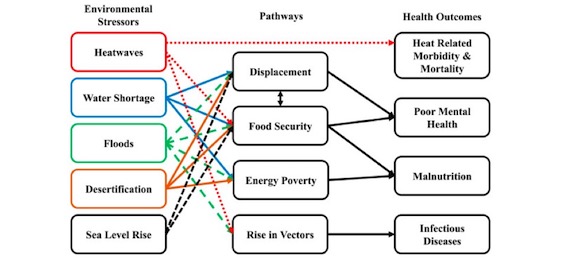Abstract
Health systems worldwide need to be adapted to cope with growing numbers of migrants and to climate-exacerbated morbidity. Heatwaves, water stress, desertification, flooding, and sea level rise are environmental stressors that increase morbidity, mortality, and poor mental health in Sub-Saharan Africa. While most migration is intra-African, climate change is also affecting migration patterns outside the continent. To tackle the health challenges induced by these events, such as infectious diseases and malnutrition, health care providers in Sub-Saharan Africa and in receiving countries in Europe must adapt their systems to provide appropriate health services to these communities. While health systems differ greatly across the global north and south, adaptation measures are similar and should be integrated. We present recommendations for adaptation of health systems to climate-related migration, including strengthening health systems, providing access to healthcare, culturally-appropriate services, policy-oriented research and training, and inter-sectoral collaboration.

Negev, M., Teschner, N., Rosenthal, A., Levine, H., Lew-Levy, C., & Davidovitch, N. (2019). Adaptation of health systems to climate-related migration in Sub-Saharan Africa: Closing the gap. International Journal of Hygiene and Environmental Health, 222(2), 311–314. https://doi.org/10.1016/j.ijheh.2018.10.004
